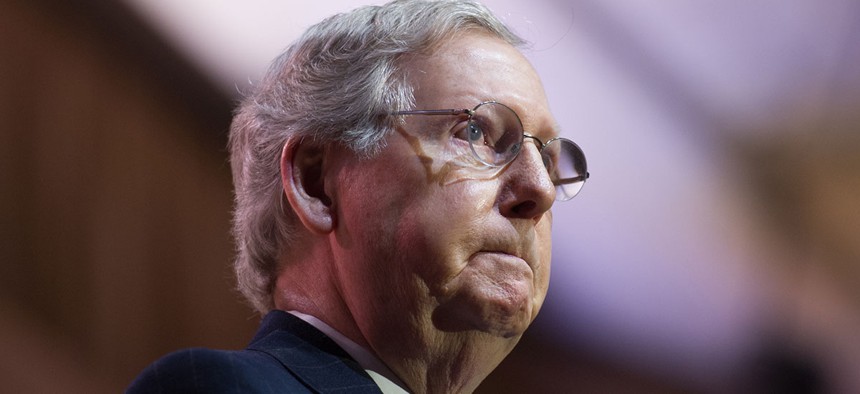
Christopher Halloran / Shutterstock.com file photo
McConnell Refuses to Budge on Patriot Act After Court Ruling Imperils NSA Spying
The majority leader, joined by other Republicans, gave a bold defense of the program just hours after a federal court ruling.
Senate Majority Leader Mitch McConnell on Thursday delivered a forceful defense of the National Security Agency's mass-surveillance powers, a salvo that came just hours after a federal appeals court ruled the agency's bulk collection of U.S. call records illegal.
McConnell criticized bipartisan legislation that would reform several aspects of NSA spying and effectively end the call-records program, and indicated he won't budge from his position advocating a clean reauthorization of expiring surveillance authorities of the Patriot Act.
"The USA Freedom Act would replace Section 215 with an untested, untried, and more cumbersome system. It would not end bulk collection of call data," McConnell said, referring to the provision of the Patriot Act that the NSA says justifies its bulk data sweeps. "Instead, it would have untrained corporate employees with uncertain supervision and protocols do the collecting. So it switches this responsibility from the NSA, with total oversight, to corporate employees with uncertain supervision and protocols."
Earlier Thursday, the U.S. Court of Appeals for the Second Circuit ruled the phone dragnet illegal. Judge Gerard Lynch said Congress needed to either provide the proper authority for the program, reform it substantially, or let it expire on June 1.
Sen. Tom Cotton, an outspoken and hawkish freshman, spoke on the floor in support of McConnell. He argued that private companies would be ill equipped to handle the demands of the NSA.
The current bulk data-collection program, he said, "helps close the gap that existed between foreign intelligence gathering and stopping attacks at home before 9/11.
"This is the gap that contributed in part to our failure to stop the 9/11 attacks," said Cotton, who has been leading briefings in recent weeks among members in a bid to preserve the surveillance program and thwart reform efforts. Cotton, notably, voted for a less robust version of the Freedom Act when it passed the House one year ago.
Cotton argued that if senators are not convinced that "the wolves are at the door," then maybe they should be attending classified briefings more regularly. And he argued that it makes sense, because of the sensitive issues involved, for the Senate to debate NSA reform in a closed session.
Sen. Richard Burr, the chairman of the Senate Intelligence Committee, also spoke on the floor, saying American grocery stores collect more data on Americans than the NSA. His point was that Americans' privacy is not at risk, but their security is.
"Make no mistake about it, the compromise legislation rolls us back to the same thing we were doing pre-9/11," Burr said.
Sen. Marco Rubio, who is running for president, joined the other senators in the program's defense, and took the opportunity to knock some of his 2016 competition.
"A perception has been created, including by political figures that serve in this chamber, that the United States government is listening to your phone calls or going through your bills as a matter of course. That is absolutely, categorically false," Rubio said. "The next time that any politician—senator, congressman, talking head, whatever it may be—stands up and says that the U.S. government is listening to your phone calls or going through your phone records, they're lying. It just is not true."
Rubio also said that "if this program had existed before 9/11, it is quite possible" that the U.S. would have known about one of the hijackers, and "there is a probability that American lives could've been saved.
"One day—I hope that I'm wrong—but one day," Rubio said, "there will be an attack that's successful. And the first question out of everyone's mouth is going to be, 'Why didn't we know about it?' And the answer better not be because this Congress failed to authorize a program that might have helped us know about it."
McConnell last month surprised many of his colleagues when he introduced a bill that would extend Section 215 of the Patriot Act unchanged for another five and a half years, until December 2020. The authority, in addition to two other surveillance authorities, is currently due to expire on June 1 of this year.
The Freedom Act is expected to easily pass the House of Representatives next week, and the measure has substantial support in the Senate; an earlier iteration of the bill fell just two votes short of advancing through the upper chamber in November.
But McConnell's gambit faces heavy resistance from Democrats, the House, and even some fellow Senate Republicans such as Rand Paul, who has vowed not to let any extension of the Patriot Act go through.
"These Republicans are ignoring the findings of national security experts that this program is unnecessary, and the decision by a federal appellate court earlier today that the program is illegal," said Sen. Patrick Leahy, the top Democrat on the Senate Judiciary Committee and an author of the Freedom Act. "Nevertheless, these Republicans seem intent on demonstrating that they are wholly out of touch with the facts, the law, and the American people on this issue."
Some Republicans, including Majority Whip John Cornyn, have said they may try to offer a short-term extension of the Patriot Act because the clock is running out. But Leahy made clear that option was off the table in his view—something that several Republicans in the House have also stated.
"I will not agree to any extension of this program," Leahy said. "Congress should take up and pass the bipartisan USA Freedom Act, which would ban bulk collection under Section 215 and enact other meaningful surveillance reforms."
(Image via Christopher Halloran / Shutterstock.com )
NEXT STORY: Data Can Make for Cutthroat Coworkers






